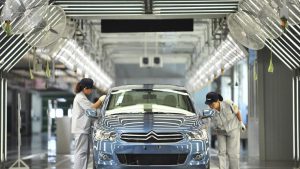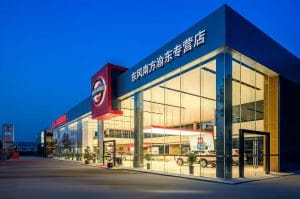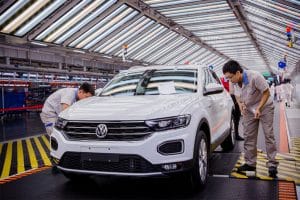
As U.S. auto production remains idle due to the coronavirus pandemic, China’s light vehicle production is ramping back up, and experts are predicting that it will drop 11.5% this year to 21.6 million vehicles.
The forecast, courtesy of research firm IHS Markit, also suggested that it will rebound in 2021, rising 7.5 percent, Reuters reported. Sales were already expected to drop 2% in China in 2020 before the outbreak began with production following a similar path.
However, the projections for China have been getting more and more pessimistic in recent weeks, as the country’s automotive infrastructure is slowly groaning back to life, and the rest of the world’s manufacturing sits quietly.
(China shows there may be light at the end of the pandemic tunnel for automakers.)

“The latest forecast takes the extended shutdown of auto plants in March and the supply chain disruption caused by the extended shutdown of the plants in Hubei province into consideration,” IHS Markit said in a post on its social media wechat account.
“For Chinese automakers which purchase auto parts from Europe, the disruption of production in Europe may be a risk factor. But at this stage, we have not seen the European coronavirus epidemic directly affect Chinese auto production.”
Just last week, IHS Markit’s outlook China’s light vehicle sales this year would drop 9.9% from last year to around 22.4 million vehicles, if China’s central government does not roll out measures to boost auto demand. Local governments have been pushing some incentives while hoping the central government follows suit.
(China starts ramping up auto plants back up — but the numbers may be exaggerated.)
However, for now it seems content to follow the path it was on prior to start of the pandemic, cutting incentives, even on its preferred New Energy Vehicles, or NEVs. That could change, however, as there were reports prior to this event the government was considering offering some smaller incentives.

China’s Association of Automobile Manufacturers (CAAM) is more optimistic about this year’s sales, suggesting they will fall just 5% this year. However, even it is calling on the government to help after sales plummeted a record 79% in February from a year earlier.
In March, CAAM outlined a list of possible steps the Beijing government could move on, including cuts to purchase taxes and measures to incentivize car sales in rural markets. The organization also wants to see authorities restore the incentives for buyers of plug-based vehicles that were largely eliminated last July.
(China new car sales drop 80% in February.)
According to Michael Dunne, founder of the Asian automotive marketing firm ZoZoGo, even in Hubei province, the epicenter of the original coronavirus outbreak. But not everything is going smoothly, Dunne noting that many Chinese factories have struggled to get a full complement of workers back on the job, limiting their production capacity.







